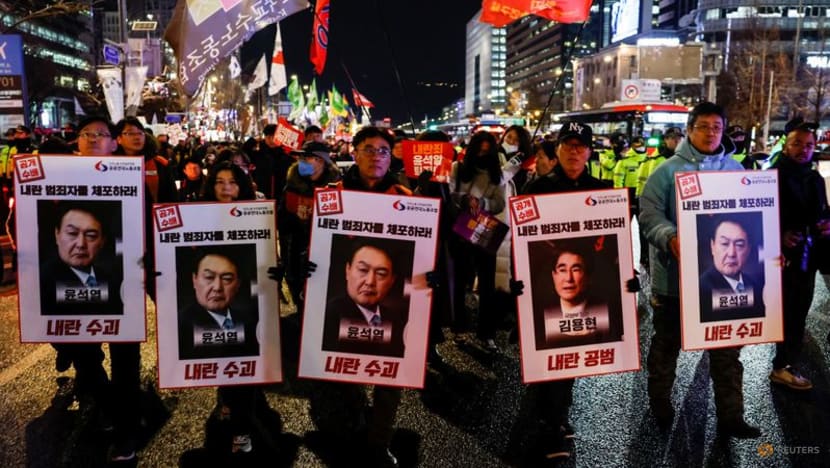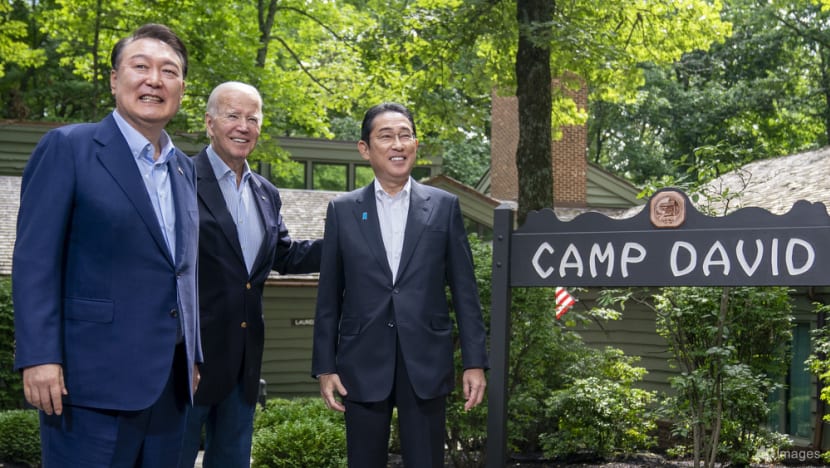South Korea’s martial law crisis has wider implications for allies: Analysts
The opposition Democratic Party’s foreign policies differ from the current conservative government’s – it wants closer engagement with North Korea and China, said experts.

Protesters demand South Korean President Yoon Suk Yeol's resignation after his failed martial law bid, in Seoul Dec 5, 2024. (Photo: REUTERS/Kim Kyung-hoon)

This audio is generated by an AI tool.
South Korean President Yoon Suk Yeol’s short-lived bid to impose martial law has thrown the nation into political chaos.
Analysts said the fallout is not just limited to domestic politics but has far-reaching consequences for South Korea’s allies.
Yoon is clinging on to power despite facing pressure from parliament and the public to resign. Members of his own ruling People Power Party have urged him to leave the party.
A vote to impeach the embattled president, led by the main opposition Democratic Party, is set to take place at the National Assembly on Saturday (Dec 7) at 5pm local time (0800 GMT).
Most observers believe a regime change in South Korea is inevitable after the botched attempt sparked national outrage and international backlash.
“Yoon is going to go, whether he likes it or not. The question is the manner of the going and how gracious,” said Steve Vickers, founder of his risk and security consultancy Steve Vickers and Associates.
Should Saturday’s vote fall short of a two-third majority needed to impeach Yoon, lawmakers are likely to double down and schedule another motion, said political science professor Jong Eun Lee.
This means a change in government – likely in favour of the more liberal opposition – is imminent and could spell complications for South Korea’s diplomatic alliances.
“They are far more sympathetic to North Korea and China. So, implications in the military agreements between the United States, Japan and South Korea are certainly exposed,” Vickers told CNA’s Asia Tonight programme.
TRILATERAL PACIFIC ALLIANCE
South Korea is in a three-way security pact with the US and Japan, where they have agreed to hold regular joint exercises, share intelligence and develop a framework for the Indo-Pacific region.

The trilateral alliance, which was announced at Camp David in the US last year, is an effort to strengthen defence ties to confront an increasingly assertive China and North Korea.
But just a year on, of three leaders who signed the pact, Japan’s Fumio Kishida has left office, Joe Biden is on his way out, and South Korea’s Yoon is facing impeachment.
Analysts said South Korea’s turmoil is the latest in a string of political shifts in the alliance.
Last month, former US president Donald Trump, who has made comments that undermine the importance of alliances, was elected to a second term.
Then, Japan’s ruling Liberal Democratic Party suffered a shock loss of its majority in the lower house after Prime Minister Shigeru Ishiba’s snap election gamble backfired.
And now, Yoon’s martial law fiasco will likely see him booted from office.
“Now, Japan is probably less likely to deliver on its bold defence reform and foreign policies,” said Bruce Klingner, a Northeast Asia senior research fellow at Washington-based think tank The Heritage Foundation.
“South Korea, which until (this week), was seen as a strong, reliable partner, joins Japan as the weak men of Asia,” he told CNA.
“The US has two allies in Asia that are going to be more inward-looking and less able to deliver on efforts to push back against North Korea and China.”
SOUTH KOREA’S ALLIES
Analysts said the left-leaning Democratic Party’s foreign policies differ from the current conservative government’s – it wants closer engagement with North Korea and to ease tensions in the peninsula. It is also likely to take a more conciliatory approach towards China.
“The ruling party and Yoon … strengthened international alliances with fellow liberal democracies including Japan, the US and European governments. That was their key selling point domestically and internationally,” Lee, a professor at North Greenville University, told CNA938.
“But the declaration of martial law has hurt and tarnished the government’s reputation among its allies, leading to concerns that South Korea may lose credibility (internationally).”
Yoon’s administration has also recently said South Korea could revisit its earlier decision not to send arms to Ukraine, in response to North Korea’s deployment of more than 10,000 troops to support Russia’s war against Ukraine. Experts said a change in government will put that discussion up in the air.
However, Sydney Seiler, a non-resident senior adviser at Washington-based think tank Center for Strategic and International Studies’ (CSIS) Korea Chair programme, expects US-South Korea ties to hold firm.
He said the bilateral relationship, which spanned seven decades since the end of the Korean War, has endured multiple political crises and is unlikely to be significantly impacted.
“It's an alliance that made it through a number of coup d'etat and other political upheavals,” he said.
“The strong ties between the US and South Korea go far beyond merely the leaders or the political parties as they come and go.”

















